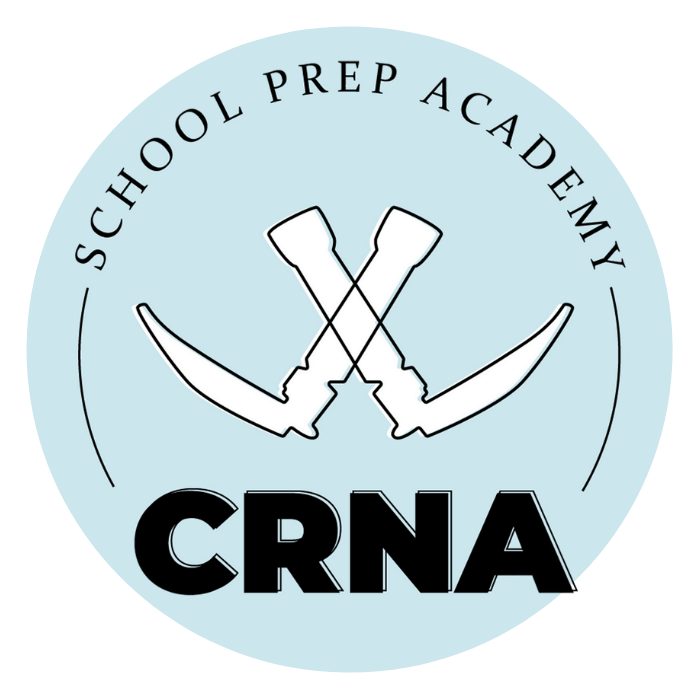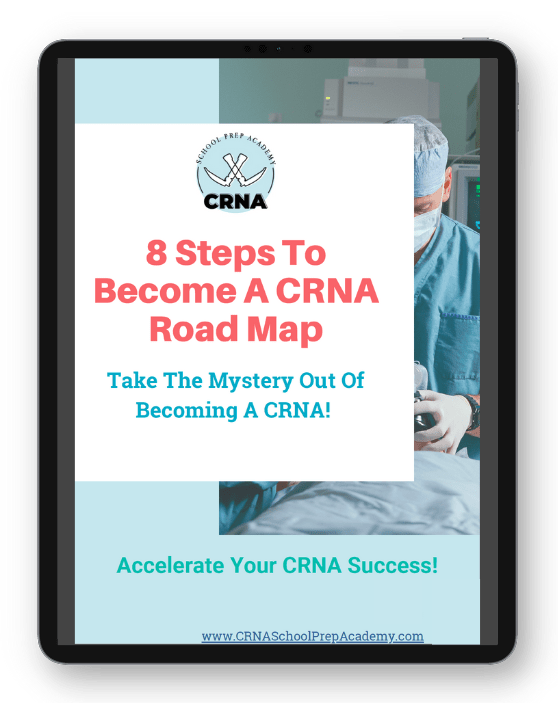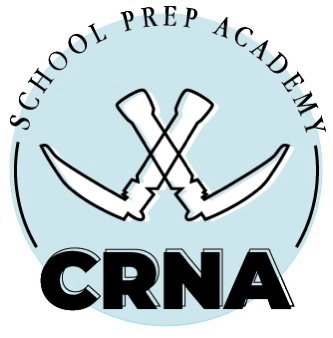
Letters of reference play a critical role in your acceptance into CRNA school! Jenny Finnell, CRNA and founder of CRNA School Prep Academy, lays out the details for getting letters of reference that help you shine here in this episode!
Get access to planning tools, valuable CRNA Faculty guidance & mapped out courses that have been proven to accelerate your CRNA success! Become a member of CRNA School Prep Academy here:
https://www.crnaschoolprepacademy.com/join
Book a mock interview, resume edit or personal statement critique:
Join the CSPA email list: https://www.cspaedu.com/podcast-email
Send Jenny an email or make a podcast request!
Hello@CRNASchoolPrepAcademy.com
—
Watch the episode here
Listen to the podcast here
Asking For Letters Of Reference For CRNA School
Who You Should Ask
In this episode, we’re going to cover Letters of Reference. We’re going to get into the who, how, when, how much does it matter, and should you do extra. Let’s go ahead and dive into it. First and foremost, who should you ask for a letter of reference from? Schools will be very specific about who they want you to get letters of reference from, so you need to be researching what your school requires. On average, you can expect to need 2 to 3 letters of reference from various people in your community.
Who are those people? Again, it depends on what the school wants. For example, one of them, for the most part, across the board, is commonly needing to be from a current nurse supervisor. Now, this can be a hang-up for some of you, especially if you had a steady nursing job where you did a lot of leadership roles but now you have started traveling. You don’t necessarily have a good long-standing history with your current nursing supervisor, but you had a very good long-standing history with your nursing supervisor with whom you worked for a year or two prior to travel.
That is a very common theme that we see these days. These are some ideas on how to get around that. I have seen students find a way and have heard program faculty advise students on how to handle that. First and foremost, some schools are going to expect a current nurse supervisor, no exceptions meaning you have to figure it out. You have to have a current nurse supervisor. I have had some schools be a little more lenient and say, “Is it a nurse educator on your unit or maybe the clinical nurse specialist versus the actual manager?”
We’ve had students whose managers are not supportive. That’s unfortunate because if they’re not supportive of writing a letter of reference, what are you supposed to do? What if you’ve been there for a year and you’ve done a great job, but for whatever reason, they are not being helpful, to put it nicely. That does stink. I’ve seen that happen to very good candidates. A lot of times, to get around that, schools will tell students to ask someone else who is in a leadership role in their unit. It could be a charge nurse, a clinical nurse specialist of some kind, or an educator on your unit.
Even though they say current nurse supervisors, sometimes they’re willing to accept a previous nurse manager, as long as you stay contingent or you peer-run on that unit. The way I’ve seen students travel and get around this issue is by staying contingent, moonlight, or whatever you want to call it. By essentially keeping your foot in the door, so technically, they’re still a current employer.
If someone is not willing to get to know you by your resume or personal statement, perhaps they are not the right individual to give you a letter of reference. Click To TweetIt also can come in handy when you get more serious and you’re actively applying to school to go back to a more study unit to get the leadership roles if you have not had that yet. If you started off by traveling, when you’re only on assignment for twelve weeks, it’s hard to get leadership roles and get involved in committee work.
I have seen students who start off with traveling, then settle on a unit they like, and then work towards getting leadership experience. Another thing too, when you start traveling early on versus later on in your nursing career, you may not be getting the sickest of the sickest patients if you don’t already have advanced training like CRRT, ECMO, balloon pumps, or things like that. If you start off on a unit and get this extra training on advanced life support mechanisms, you’re more likely to get the sicker cases when you do travel. Keep that in mind as well.
Anyhow, back to references. Again, 1 or 2 to 3 professional references. Sometimes, they will say from a physician or an attending, but here’s another thing that people don’t think about too: A lot of schools will require a letter of reference from a program faculty member, not the CRNA program faculty but your nursing program faculty or any program faculty that knows you academically. They want someone who can attest to your academic ability and, more than your ability, but your drive and your passion for being a learner.
I know some of you are like, “I’ve been out of school for many years. What the heck?” The good news is, if you’ve been out of school for more than ten years, you’re more than likely going to have to go back and repeat some core Science courses anyways. Take advantage of that and get to know those professors. Work hard. Stay after and ask questions. Let them know who you are by name, and so when you go up to them at the end of the semester or quarter and you ask for that letter of reference, they will know you very well. Make a point on the very first day of class to say that you’re here to excel and learn as much as you can and you’re excited to be here.
Let them know that you’re there to, again, be an active learner. If you do that and nurture that relationship over the semester, by the end or even a month or two later, when you go back to ask for a letter of reference, they’re going to remember who you are and be happy to do so. If you have been out of school for 2 or 3 years and you don’t need any additional courses, that is something to think about now, especially if you’re early on, is to think about who would you ask? Was there a clinical preceptor that you favored while you were in nursing school? Would they remember who you are?

I applied to school after being out for three years. I did go take a graduate Statistics course but I did that in my undergrad. I knew I needed it, so I took it in my undergrad. I had it all this time because I was a fifth senior nursing student. I did that, but at that time, I don’t remember knowing 100%. I don’t remember knowing that I needed a professor for a reference letter but I did for my program. I happened to connect with a clinical coordinator or professor during my senior rotation.
She was very pivotal in getting me OR experience as well as an ICU position as a senior nursing student. She was someone who I looked up to and worked well with. I shared with her that I want to go back to CRNA, which is why I wanted to get experience in ICU as a nursing student and in the OR to make sure that I’m setting myself up for success if I were to pursue this path.
I reached out to her even though it had been two and a half years later, and she remembered who I was. I didn’t know it at that time but the fact that I shared what my goals were, I made a point to get to know her and thank her for everything she did for me while I was a student, it set me up for success, later on, to be able to ask for that letter of reference for grad school.
Again, some things to think about as far as who to ask. I also want to caution you because sometimes you think because you pick someone who has a big name, that you’re automatically going to be like, “They’re going to be so impressed with this. I got the chief of surgery to write me a letter of reference or this physician or whoever it is.” The reality is the references are not going to get you into CRNA school.
They can break you but they’re not going to get you into CRNA school. Don’t focus as much on the big names as much as how well they know you because even if it’s a big name, if they said they’d do a letter of reference and they don’t truly know you and can’t speak to your ability, it’s not going to do you any good probably. Think about that. Make sure you ask people who truly know and can speak to your ability and who can highlight who you are as a person. Again, they should be people that you work with closely on a routine basis. That is covering who to ask.
If the person you are requesting a letter of reference from is dragging their feet to do the job, ask someone else. The last thing you want is to miss your deadline because you're waiting for them. Click To TweetHow To Do It
Now, let’s go into how because I’ve had students say, “Jenny, I want to go into CRNA school quickly but I just started. I’m starting orientation. Is it too soon to ask for a lot of references?” Probably a little too early. If you’re still on orientation, I would not be asking for letters of reference, even if you want to apply to CRNA school relatively quickly. Now, that being said, I would embrace your time as a new ICU nurse. I don’t see anything wrong with applying to CRNA school as soon as possible.
I have one of my best girlfriends and fellow CRNA who applied to CRNA school with just six months of ICU experience and she did get accepted. By the time she started her program, she had met the one-year minimum, and she’s an excellent CRNA. With that being said, she was extremely teed up to do so. She planned well and thought ahead, and that was her goal all along. She probably waited until she had right about five months of ICU experience to ask for that letter of reference.
I also want to go into how I want to caution you by waiting until the last minute to ask for a letter of reference. We’ll get into that a little bit more. How? Essentially, you want to plan ahead because you can have ideas of who you would want to ask, and get to know them even more. Not that I like the term butter up, but why not? You should go above and beyond. Whoever you think you may be asking whether that’s an attendee, offer to do literature research for them. What are they working on? Show that you’re there to learn, ask questions during reports, and be very proactive in your nursing and your approach to how you interpret their education.
Ask for them to teach you. If you go up to them on a routine basis and try to learn more about your patient’s disease process and why they prescribed certain medications, they’re going to take notice. 4 or 5 months down the road, when you do ask for a letter of reference, they’re going to be excited to do that for you because you have expressed, shown interest, how they can help you, and the fact that you were invested in your own education.
Now, I’m not trying to say that in a way so you do it for show. I truly think you should embrace that entire mindset and approach to being a nurse and CRNA but think about it ahead of time. That way, you can be more proactive about who you are going to for guidance because those would be the people you would want to ask for references down the road. You will be displaying to them that you’re an active learner and you’re excited about what you’re doing or being an ICU nurse.

Those are some things to think about as far as the how. I also think as far as how, you need to be making sure you’re giving these people enough notice. If your application is due in a few weeks, it is not appropriate to ask for a letter of reference with only a few weeks to go. Most people are busy, including yourself.
Think about what you would want people to ask you, and if someone were to come to you for a letter of reference, how much time would you expect them to give you? Would you be at the drop of a hat and be able to write a letter of reference, especially if you’ve never done one before? No. It could be even sometimes intimidating for someone to ask you for a letter of reference because now they’re like, “I would love to but I don’t even know where to start.”
That’s what I think too. Give them some guidance. Show them what the school requires by verbatim. Show them what you’re expected to have from them and then provide them some guidance. Maybe write them some of your accomplishments, some of the things you’re proud of, and things that you have been actively working towards. Give them some insights, so they have some beef to go with. What I like to get from the letters of reference that I have done is I ask for their resume. That’s pretty straightforward.
Provide your resume and personal statement because they can use these things to help them like, “That’s cool that they do this.” They can add that in their reference statement. Give them some background, even if they know you because you’ve been proactive on the unit asking questions. They still don’t probably know exactly who you are unless they’re your dad. Give them some beef as far as who you are as a person so they get to know you more on a personal side by providing a resume as well as a personal statement for your graduate program.
Those are two things you can do to help you. I had students tell me that when they asked for letters of reference, they were told, “You write it for me and I’ll sign off on it.” First of all, I don’t like this. However, it happens pretty frequently from my experience. The program faculty that I have shared this with also do not like that. However, we can’t fix what people are asking for and their expectations. What I want to caution you on is that possibly may not be the right person to ask, in my humble opinion.
If someone doesn't like you and you ask them for a letter of reference, you are missing something as far as interpreting who you are, how you react, and how your relationship is with that person. Click To TweetIf they can’t be willing to get to know you by your resume or personal statement to write you a letter of reference and they expect you to do it for them- It says to me that maybe that’s not the right person. Take it for what it is. I’m not saying you don’t do it if that’s your only option. However, it may be that maybe you should try to get some other people possibly. If you were to do your own letter of reference, utilize the same techniques. Resume, personal statement, highlight your abilities and outline in a very concise one-page format why you would be a good applicant for their program.
I also would encourage you that if someone were to come back and say that to you, to at least ask them to give some of their personal insight and maybe spell it out for them like, “Answer these three questions about me. Can you incorporate these three questions about me into this personal reference that I will then write for you?” That’s my recommendation. That way, there’s some personal touch other than from you because the last thing you want is to have these programs potentially notice that it wasn’t written by someone else. Be careful with that.
That goes into the how and the timing of it. I would say, on average, give them at least 2 months, maybe 3 prior to the deadline of your application. Don’t forget and don’t be unwilling to abort. If someone is dragging their feet and you’ve reminded them and they’re dragging their feet, ask someone else. The last thing you want to do is miss your deadline because you’re waiting on your letter of reference.
Another thing too that you can do is ask for a letter of reference, then a few days or a week later, give them a Starbucks gift card for $5. Buy him a coffee and say, “Thank you for writing me a letter of reference. It means a lot. I appreciate it.” What you’ve done to their brain, they’re like, “Thank you. Now that you did something kind for me, let me do something kind for you back. You asked me to do this. I said I would and you reminded me. I got to do this and you were sweet about how you thanked me for my time, so I’ll go ahead and get this done for you.”
Nursing CAS
Sometimes, it takes a little bit of extra incentive to push people to action. Hence, what we do inside the CRNA School Prep Academy all the time and it works wonderfully is to give him a little bit of extra incentive to do things. Don’t forget about that as well. Let’s cover Nursing CAS, which stands for Centralized Application System. There is one big red flag that I want to point out with Nursing CAS. There’s probably more but this one stands out to me because I came across this in our Facebook community. I was like, “I need to share this because how awful.”

I wouldn’t even say half the programs use Nursing CAS but a good amount use it. Maybe 30% of programs, 40% or around there. Not half but it’s becoming a more popular system to submit letters of reference and application materials. One thing is they do offer professional transcript entry, which essentially means that they do it for you. They take all your transcripts. If you have five transcripts and they enter all that data for you versus you doing it and potentially making a mistake.
The cost is, I think someone said, $95 to have them do it. Here’s the catch. First of all, it’s not refundable and it takes ten business days from the time they receive all of your transcripts. If you have several of them, you don’t get them in right away, and they come in weeks at a time, they’re not going to start the process until they’ve received everything. From there, it’s ten business days or two weeks to complete then you have to review and verify what they did. After that, there’s a two-week submission period.
Two weeks after they gain all your transcripts, then you have to review what they did and confirm, then there’s a two-week submission period. That right there, even if you reviewed it from the day they sent you that email, that’s one solid month at minimum that it would take after they get all of your transcripts to submit your transcripts to your school.
What happened to the student? She had a month prior to her deadline. She did this but by the time she got all of her transcripts in there and started doing it, she realized, “I’m not going to make my deadline anymore.” She ended up having to do it herself anyways and they would not refund her money. Word of caution, if you’re using Nursing CAS, plan ahead and be prepared for that.
Other Submission Methods
Let’s go into other methods of submitting letters of reference. It says something that more than half of the programs don’t even use CAS. Some schools are old school and they want a paper submission, meaning some schools would literally have you print out a reference form. Hand it to someone. They have to check all the boxes and have them physically mailed in. This is how I did it back in the day. It seemed like so long ago but it’s crazy how much things have changed in a short period of time. The way I did it was you had to obviously give them a piece of paper. They had to check all these boxes, then they had to write a letter for you, print it out, and put it in an envelope that I stamped and addressed to the admissions program office.
Sometimes, it just takes a little bit of extra incentive to push people to take action. Click To TweetPhysically, if you had to send it somewhere, then you put it in double envelopes. I personally gave it to them at work because I worked with these people. I had to make sure it was already going to a pre-stamped addressed envelope, so there was very little work for them to do after they got that done. Keep that in mind. Some schools will physically email the person doing your reference.
We’ll physically email them from their college admissions program and seek the letter of reference that way through their own form, then there’s Nursing CAS. The other thing about Nursing CAS too, is whoever does your letter of reference has the option to allow you to reuse that reference for other programs. Tell them and ask them. I know I’ve used it a few times and it’s easy to miss that button. If you don’t click that little button before you hit submit, then you can only use that reference for that one school. It could be nice to be able to reuse references.
The catch and what I want to warn you about is whoever is writing your letter of reference, specifically the names of the school that you’re applying to, might ask you, “Where are you applying to school?” They may specifically say, “I think there’ll be a great candidate for the X, Y, and Z program.” You don’t want to reuse that letter of reference anyways because it will look unprofessional to submit a letter of reference that has a different school name on it. Keep that in mind.
These are things you have to let your person know that are doing the letters of reference for you. The other option is if they have it typed up in a word document, they can send it to you. You can modify the school name, then you would do it for them.
In some schools, you can submit your letter of reference and so therefore you would submit it. Some schools will email the person to do it themselves. As long as they have a state on their computer, they can update the school name, but you have to let them know. “I need another letter of reference and it’s this program this time. Can you please submit this next letter of reference?”

Do These Letters Matter?
It’s not a big deal to resubmit more references once you already have the main reference done. Keep that in mind as well. It could be snail mail, via the school’s own form, or Nursing CAS. Those are the three that I have encountered. I talked already a little bit about when and how you want to plan ahead for that. Let’s get into how much it matters for letters of reference. What I have been told by program faculty is it can’t make you, but it can break you.
98% to 99% of people who submit letters of reference are going to be good unless you’re a bad picker and you think, “They love me,” and they’re like, “I don’t like that person. Sure, I’ll write her a letter of reference.” Hopefully, you’re not picking people like that, but that goes maybe to show that you’re missing something and you’re not reading someone well. If someone doesn’t like you and you ask them for a letter of reference, there’s something that you’re missing as far as interpreting who you are, how you react, and how your relationship is with someone. That could be a big red flag to a program.
If you submit a letter of reference and it’s a bad letter of reference, they’re going to be like, “Clearly, you do not understand this person who has it out for you.” Most people, for the most part, have good letters of reference. Most people are not going to write you a bad letter of reference. Keep that in mind, as far as it’s not going to make you but it could break you. Again, as far as how much it matters, it’s not going to gain you acceptance from the program. You still have a lot of other things they look at and assess and score you on as far as an applicant, but they do matter, and they are important.
Make sure you’re picking the right person. I’ve had students ask me a lot, “Jenny, what if I submit extra references? Would that help me?” Sometimes, they kill themselves and get ten references.” First, if you’re the typical applicant, you probably don’t need to be doing this. It’s probably going to be a waste of your time but let me embrace getting extras and when that would be appropriate. Now, of course, if you have someone who knows you and has been your mentor. Maybe it’s a neighbor who’s a CRNA or someone that, again, you’ve built this relationship with that you’ve job shadowed several times or whatever, get an extra letter of reference.
I’m not telling you not to do that, but maybe 1 or 2 extras, not 10, as far as when this comes into play. I had a program faculty tell me that we had a student who was trying to gain admission to CRNA school. She has been rejected from two different interviews. She’s a good student and going to make it. I know she will, but she’s doing everything and anything to help them.
One of the biggest factors that are probably hindering her is her GPA. She’s doing all the right things. She’s making up for it. However, she still didn’t get an interview. She showed up at an AANA faculty meeting. Not too many people do that. That’s amazing. Of course, I’m speaking about her to everyone who’s coming to my table at this event because I’m like, “One of our students is here. This is so cool.” One of the program faculty people even said, “Is she applying to my program? We want her. That’s amazing.”
I told them how she didn’t get an interview. They’re like, “Oh.” I’m like, “I think it’s her GPA.” They’re like, “What you can do is you can write her an extra letter of reference and speak to her and how she’s coming to these events and how she’s engaged in the community. That would serve her well.” I had a student who I’ve been mentoring for over a couple of years now who had been rejected from CRNA school. He gained acceptance. I shouldn’t break the news. I’m not going to even say who it is, but I’m so excited for him. I did write him a letter of reference. I spoke to how he was showing up within our community and coming to events that we were doing.
He did everything. I’m going to bring him to the show. Extras can play into potentially being beneficial, especially for the applicants who have something in their past that may be hindering them otherwise. Keep that in mind. Connect with the community. I speak it and preach it all the time, but it’s so important. Getting involved is a great way to be.
It shows that you’re not just invested in yourself. You’re invested in others, and the programs want people who are invested in the community and how they can give back. That’s where extras can play into the picture. I hope you enjoyed this episode. It was fun to do. I hope you’re all having a wonderful day. We will see you for another episode. Thank you so much.
Important Links
Get access to planning tools, valuable CRNA Faculty guidance & mapped out courses that have been proven to accelerate your CRNA success! Become a member of CRNA School Prep Academy here:
https://www.crnaschoolprepacademy.com/join
Book a mock interview, resume edit or personal statement critique:
Join the CSPA email list: https://www.cspaedu.com/podcast-email
Send Jenny an email or make a podcast request!


